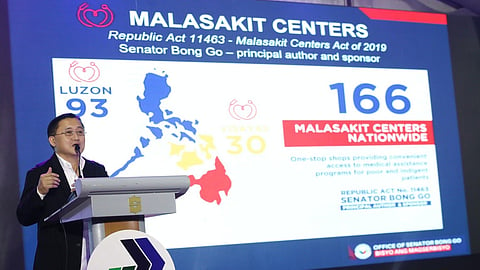Go seeks overhaul of nursing education
Senator Christopher “Bong” Go, Chairperson of the Senate Committee on Health, has refiled a bill at the start of the 20th Congress aimed at strengthening the welfare of Filipino nurses by amending Republic Act No. 9173 or the Philippine Nursing Act of 2002.
The proposed legislation, titled the “Advanced Nursing Education Act,” underscores Go’s continued advocacy to enhance the nursing profession and raise the Philippines’ standing as a global leader in healthcare services.
Go praised Filipino nurses for their globally recognized skill, dedication, and compassion but lamented the current emphasis on producing graduates for overseas work, often at the expense of local expertise and leadership development.
“Filipino nurses are world-renowned for their skill, inherent compassion, and eagerness to provide care for their fellow people. The success of our nurses has brought recognition of our skills and qualities as a nation. Further, there has never been any doubt as regards the contribution Filipino nurses have made for the benefit of our economy,” Go said.
He argued that while the Philippines produces a large number of nursing graduates, advanced educational opportunities remain limited.
“Too much emphasis has been placed on producing nursing degree-holders, so that the opportunity to further educate our nurses in advanced programs has been overlooked,” he said.
The senator proposed expanding graduate-level education for Filipino nurses to prepare them for leadership, research, and specialized practice roles.
“Advanced nursing education programs can further catapult our nurses to realize greater opportunities through the opening up of leadership roles, specialization in specific practice areas, and recognition in the fields of research and advanced nursing education,” Go added.
The measure includes key amendments to Section 25 of the Nursing Act to define nursing education as encompassing both basic and graduate programs, under the regulation of the Commission on Higher Education (CHED).
It establishes a Basic Program for Nursing Education with a focus on community immersion and national competency standards. Admission would require passing a National Nursing Admission Test.
Additionally, the bill proposes a Graduate Program for Nursing Education to equip practicing nurses with advanced skills in critical areas such as ambulatory care, critical care, palliative care, and other specializations.
“By introducing a new dimension to the local nursing education program... we can elevate our status further to be recognized as a producer of leaders, experts, and authorities in the field of nursing,” Go said. “As the Chairperson of the Senate Committee on Health and Demography, I am deeply committed to advocating for our healthcare workers, especially our nurses... Ang inyong trabaho ay hindi lamang mahalaga kundi isang tunay na inspirasyon sa ating lipunan,” he added.
US still needs Filipino nurses, but immigration concerns remain
Despite consistent demand for healthcare professionals in the United States, Filipino nurses remain wary of immigration hurdles, especially under the current administration.
US Ambassador to the Philippines MaryKay Carlson earlier affirmed that Americans “have high regard” for Filipino nurses, especially for their work during the pandemic.
The Philippine Nurses Association of America (PNAA) said the US continues to offer job opportunities for Filipino nurses, but navigating immigration policies remains a key challenge for applicants.


